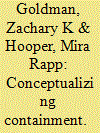| Srl | Item |
| 1 |
ID:
136459


|
|
|
|
|
| Summary/Abstract |
When Britain entered the First World War it did so as an especially hesitant belligerent. One month later, the British enthusiastically signed the Treaty of London, stating that the Entente powers would prosecute the war in common and that none would pursue a separate peace. Why would a state long known for jealously guarding its ability to maintain a free hand initiate a binding alliance that restricted its war termination prospects after one month of combat? And what were the effects of its decision to do so? Answering this question requires not only that we examine British decision making but that we understand No Separate Peace Agreements and why states sign them. I hypothesize that a state will initiate a No Separate Peace Agreement when it has reason to fear that one of its cobelligerents may defect. I also hypothesize that No Separate Peace Agreements will cause states to reconcile war aims with their allies, agreeing to different terms of peace than might have been necessary to satisfy any one of them individually. Using new archival documents, I analyze a case study of British decision making in the early weeks of World War I and find substantial support for the hypotheses.
|
|
|
|
|
|
|
|
|
|
|
|
|
|
|
|
| 2 |
ID:
126692


|
|
|
|
|
| Publication |
2013.
|
| Summary/Abstract |
Zachary K. Goldman and Mira Rapp-Hooper discuss American security interests in the Persian Gulf region and the prospects for effective cooperation among Gulf States to contain Iran. They ?nd that it is unlikely that the United States will be able to establish a containment regime that relies upon the Gulf Cooperation Council and that informal, bilateral ties to states in the region are a preferable policy recourse.
|
|
|
|
|
|
|
|
|
|
|
|
|
|
|
|
| 3 |
ID:
143015


|
|
|
|
|
| Summary/Abstract |
“Let me reiterate that our treaty commitment to Japan's security is absolute,” declared President Barack Obama in Tokyo in April 2014. “Article 5 covers all territories under Japan's administration, including the Senkaku Islands,” he continued, referring to the part of the alliance whereby the United States promises to provide military aid to Japan if it is attacked.1 Days later, the President announced a new basing agreement in Manila, affirming Washington's commitment to help “build the Philippines’ defense capabilities,” calling it a “vital partner” in maritime security.2 These two presidential statements underscore an increasingly salient set of regional policy quandaries. Maritime and territorial disputes in the Pacific have become prominent in recent years and, when U.S. allies are involved, they present a unique challenge to extended deterrence in the region—one with which Washington is only beginning to grapple.
|
|
|
|
|
|
|
|
|
|
|
|
|
|
|
|